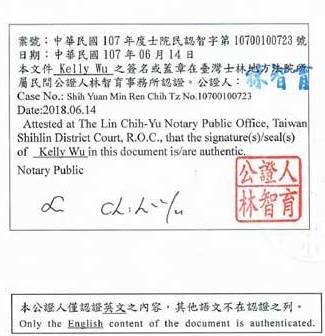
Schmidt & Schmidt offers the legalization of documents from Taiwan.
The partially recognized Republic of China (Taiwan) is officially recognized by only 12 United Nations member states. However, Taiwan maintains relations with most countries globally through its representative offices that have the status of non-governmental organizations.
Due to the non-recognition by most states, Taiwan has not joined the Hague Convention Abolishing the Requirement of Legalization for Foreign Public Documents
Similar to the apostille, authentication methods validate documents by confirming the authenticity of their stamps, seals, and signatures. This includes embassy legalization procedures, which provide an additional layer of document verification. Such processes ensure credibility and are used to make documents acceptable in nations that haven't signed the Hague Convention. However, there's a difference: while apostilles are universally accepted among Hague Convention signatory countries, documents that have undergone authentication and legalization are only valid in the specific countries where they have been legalized.
Therefore, in Taiwan, one cannot obtain an apostille. Instead, documents must undergo the authentication and consular legalization process.
Designated Competent Authorities in Taiwan
In Taiwan, documents requiring legalization will typically need to go through the Ministry of Foreign Affairs. In addition, Taiwan maintains representative offices in multiple countries, which function similarly to embassies and consulates and assist in the legalization process.
In order to complete the legalization process seamlessly, your documents will usually need to pass through a few steps. First, the document gets an official stamp in Taiwan. Then, it gets another stamp from the embassy or representative office of the country where you want to use the document, which can be located in Taiwan. This ensures the document is recognized and accepted in the destination country.
The responsible authorities will carefully examine the document to verify if the signatures, stamps, or seals align with their own records. If they are confirmed to be authentic, the document will be legalized.
In Taiwan, legalization means a document will be confirmed by an official in Mandarin, with a handwritten signature of an official and an official seal.

The following documents can be legalized:
- Extracts from the commercial register
- Certificates of civil status (certificates of birth, death, marriage and divorce)
- Education documents (school reports, certificates, diplomas)
- Court decisions
- Notarized copies of documents
- Notarized translations
- Further notarial documents (authorizations, last will, declarations)
Specific aspects and document requirements in Taiwan
Taiwan is not among the 120 countries that recognize and issue apostilles in accordance with the Hague Convention of 5 October 1961. This means that in order to confirm the official status of a document, it will need to go through the process of legalization or notarization.
The process can vary depending on the sender and recipient country, but typically, to obtain an authentication for a document in Taiwan, you must go through the following steps:
- Notarization: Begin by having your document notarized through one of the recognized notary public services
- Authentication:Your document undergoes authentication by the respective country or state authority
- Foreign Affairs or Central Government Authentication: The document receives an endorsement from the central government or its foreign affairs department
- Taiwan Representative Office Legalization: The last step involves the representative office or consulate of the destination country, where the document is officially legalized
This process can be time-consuming, especially if it includes multiple documents and different countries. To ensure a smooth and accurate legalization process, it is recommended to seek guidance from specialists familiar with the requirements and procedures. Their expertise can help avoid delays and errors in the legalization of documents.
Document requirements that might apply:
- The document must be an original or a certified copy issued by the competent authority
- The document should contain all relevant and accurate information
- The document must be in the official language of the issuing country or translated into the official language of the destination country
The process of legalization will vary depending on the type of document and the countries involved, as unlike the apostille, there is no uniform format.
Legalization of Taiwan educational documents for use abroad
For educational documents issued in Taiwan, such as school reports, university degree certificates, transcripts of records, enrollment certificates, and other school or university certificates, to be recognized and valid abroad, they must undergo an authentication process through legalization.
Educational certificates from Taiwan must bear the attestation from the Ministry of Foreign Affairs or a Notary Public. This is sometimes referred to as attestation, a process that ensures a document's genuineness to the receiving institution or nation. For Taiwan documents, this typically means undergoing multiple attestations from various governmental departments, both within Taiwan and in the foreign nation where the document will be used.
Such an approach ensures that educational documents possess the necessary legal authority, allowing them to be recognized and used across various countries. While these are general procedures, the exact requirements may vary, so it is advisable to confirm the specific steps with the relevant authorities.
Consular legalization of Taiwan documents for use abroad
Consular legalization is the process of authenticating or certifying a legal document so a foreign country's legal system will recognize it as having full legal effect. This procedure is carried out by the diplomatic or consular mission of the country in which the document is to be used.
This procedure is required when the destination country does not recognize or accept apostille certification. One needs to submit the original document, along with any required copies or supporting materials, to the respective consular office. The consular officials will review the document, verify its authenticity, and affix their seal or stamp to certify its validity.
The consular legalization process may require additional steps, such as obtaining translations of the document into the language of the destination country or providing additional supporting documentation as requested by the consular office.
It is up to the diplomatic mission to decide about the authentication procedure. The specific requirements and procedures for consular legalization may vary depending on the regulations of the destination country.
Consular legalization in all cities of Taiwan
Schmidt & Schmidt provides consular legalization services for public documents originating from all regions across Taiwan. We handle the entire process, from document review to obtaining the necessary certifications, ensuring that your documents are valid and recognized internationally. With our reliable services, you can confidently use your Taiwan public documents abroad.
Procurement of documents from Taiwan
If important documents are lost or damaged, or current copies of the documents are needed, the re-issue of the documents is required. It is not unusual for people outside Taiwan to encounter difficulties obtaining new documents when abroad. Our consultants will help you procure new documents from Taiwan remotely, and we can arrange for your documents to be sent by courier anywhere in the world.
Certified translation of documents from Taiwan
Copies and transcripts of civil status documents can be translated into any language by a sworn translator in Taiwan, or the translation can be done in the country of destination. We offer certified translations of civil status documents with further certification. The cost of the work is calculated according to the volume of the document in question.

























































